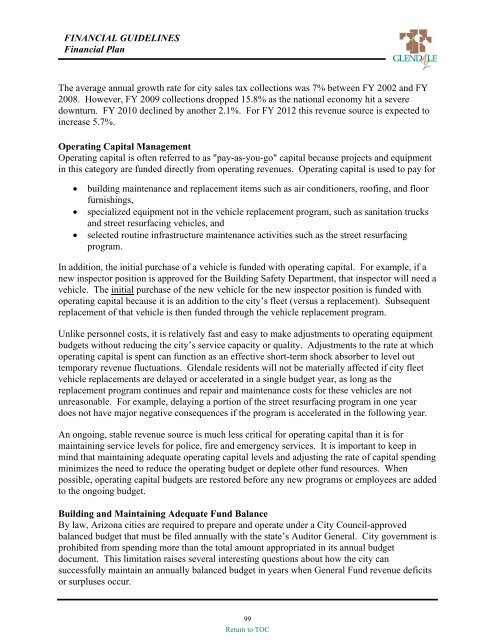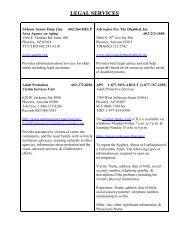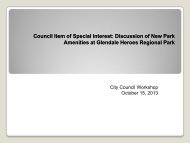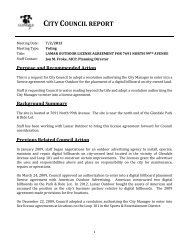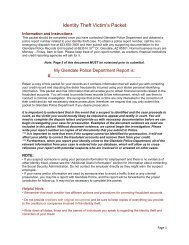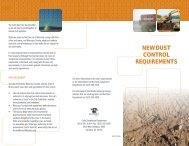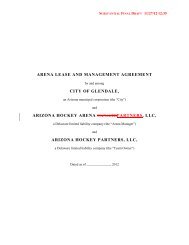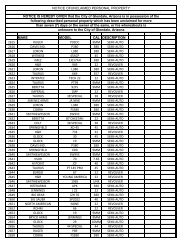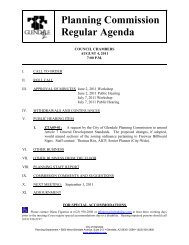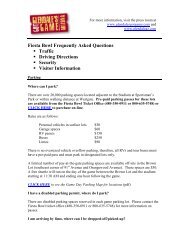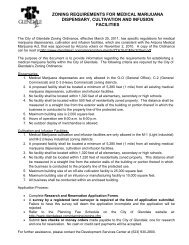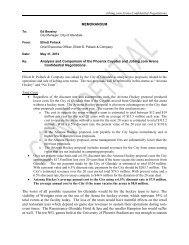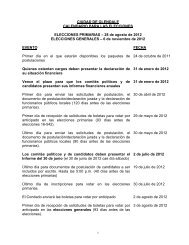- Page 1 and 2:
PRELIMINARY FY 2011-12 CITY OF GLEN
- Page 3 and 4:
CITY OF GLENDALE, AZ Table of Conte
- Page 5 and 6:
CITY OF GLENDALE, AZ Table of Conte
- Page 7 and 8:
CITY OF GLENDALE, AZ Mayor & City C
- Page 9 and 10:
CITY OF GLENDALE, AZ City Managemen
- Page 11 and 12:
CITY OF GLENDALE, AZ Map of Glendal
- Page 13 and 14:
CITY OF GLENDALE, AZ Financial Orga
- Page 15 and 16:
CITY OF GLENDALE, AZ Financial Orga
- Page 17 and 18:
CITY OF GLENDALE, AZ How to Make th
- Page 19 and 20:
CITY OF GLENDALE, AZ Budget Calenda
- Page 21 and 22:
CITY OF GLENDALE, AZ Budget Calenda
- Page 23 and 24:
CITY OF GLENDALE, AZ Budget Process
- Page 25 and 26:
CITY OF GLENDALE, AZ Budget Process
- Page 27 and 28:
Honorable Mayor and Council: BUDGET
- Page 29 and 30:
BUDGET MESSAGE City Manager’s Bud
- Page 31 and 32:
BUDGET MESSAGE City Manager’s Bud
- Page 33 and 34:
BUDGET MESSAGE City Manager’s Bud
- Page 35 and 36:
BUDGET SUMMARIES FY 2011-12 CITY OF
- Page 37 and 38:
BUDGET SUMMARY Budget Summary A sum
- Page 39 and 40:
BUDGET SUMMARY Budget Summary Refer
- Page 41 and 42:
BUDGET SUMMARY Budget Summary Emplo
- Page 43 and 44:
BUDGET SUMMARY Budget Summary contr
- Page 45 and 46:
BUDGET SUMMARY Budget Summary Durin
- Page 47 and 48:
BUDGET SUMMARY Budget Summary revie
- Page 49 and 50:
BUDGET SUMMARY Budget Summary Debt
- Page 51 and 52:
BUDGET SUMMARY Revenues REVENUES To
- Page 53 and 54:
BUDGET SUMMARY Revenues Sales Tax 4
- Page 55 and 56:
BUDGET SUMMARY Revenues State sales
- Page 57 and 58: BUDGET SUMMARY Revenues Thousands $
- Page 59 and 60: BUDGET SUMMARY Revenues Transportat
- Page 61 and 62: BUDGET SUMMARY Revenues Enterprise
- Page 63 and 64: BUDGET SUMMARY Revenues Additional
- Page 65 and 66: BUDGET SUMMARY Expenditures Operati
- Page 67 and 68: BUDGET SUMMARY Expenditures Table 3
- Page 69 and 70: BUDGET SUMMARY Expenditures The nex
- Page 71 and 72: BUDGET SUMMARY Expenditures Table 4
- Page 73 and 74: BUDGET SUMMARY Expenditures Please
- Page 75 and 76: BUDGET SUMMARY Expenditures Also in
- Page 77 and 78: BUDGET SUMMARY Expenditures distrib
- Page 79 and 80: BUDGET SUMMARY Expenditures Percent
- Page 81 and 82: BUDGET SUMMARY Expenditures A Frequ
- Page 83 and 84: FINANCIAL GUIDELINES Five-Year Fore
- Page 85 and 86: FINANCIAL GUIDELINES Five-Year Fore
- Page 87 and 88: FINANCIAL GUIDELINES Five-Year Fore
- Page 89 and 90: FINANCIAL GUIDELINES Five-Year Fore
- Page 91 and 92: FINANCIAL GUIDELINES Five-Year Fore
- Page 93 and 94: FINANCIAL GUIDELINES Five-Year Fore
- Page 95 and 96: FINANCIAL GUIDELINES Five-Year Fore
- Page 97 and 98: FINANCIAL GUIDELINES Five-Year Fore
- Page 99 and 100: FINANCIAL GUIDELINES Financial Plan
- Page 101 and 102: FINANCIAL GUIDELINES Financial Plan
- Page 103 and 104: FINANCIAL GUIDELINES Financial Plan
- Page 105 and 106: FINANCIAL GUIDELINES Financial Plan
- Page 107: FINANCIAL GUIDELINES Financial Plan
- Page 111 and 112: FINANCIAL GUIDELINES Financial Poli
- Page 113 and 114: FINANCIAL GUIDELINES Financial Poli
- Page 115 and 116: OPERATING BUDGET FY 2011-12 CITY OF
- Page 117 and 118: Mission and Performance Measure May
- Page 119 and 120: Mission and Performance Measure May
- Page 121 and 122: City of Glendale Budget Summary by
- Page 123 and 124: Mission and Performance Measure Cit
- Page 125 and 126: Mission and Performance Measure Cit
- Page 127 and 128: Mission and Performance Measure Cit
- Page 129 and 130: Mission and Performance Measure Cit
- Page 131 and 132: Mission and Performance Measure Cit
- Page 133 and 134: Mission and Performance Measure Cit
- Page 135 and 136: Mission and Performance Measure Cit
- Page 137 and 138: Mission and Performance Measure Cit
- Page 139 and 140: City of Glendale Budget Summary by
- Page 141 and 142: Mission and Performance Measure Fin
- Page 143 and 144: Mission and Performance Measure Fin
- Page 145 and 146: City of Glendale Budget Summary by
- Page 147 and 148: Mission and Performance Measure Man
- Page 149 and 150: Mission and Performance Measure Man
- Page 151 and 152: Mission and Performance Measure Man
- Page 153 and 154: City of Glendale Budget Summary by
- Page 155 and 156: Mission and Performance Measure Cit
- Page 157 and 158: Mission and Performance Measure Cit
- Page 159 and 160:
City of Glendale Budget Summary by
- Page 161 and 162:
Mission and Performance Measure Gle
- Page 163 and 164:
Mission and Performance Measure Gle
- Page 165 and 166:
City of Glendale Budget Summary by
- Page 167 and 168:
Mission and Performance Measure Mar
- Page 169 and 170:
Mission and Performance Measure Mar
- Page 171 and 172:
City of Glendale Budget Summary by
- Page 173 and 174:
Mission and Performance Measure Com
- Page 175 and 176:
Mission and Performance Measure Com
- Page 177 and 178:
City of Glendale Budget Summary by
- Page 180 and 181:
Mission and Performance Measure Bui
- Page 182 and 183:
Mission and Performance Measure Bui
- Page 184 and 185:
City of Glendale Budget Summary by
- Page 186 and 187:
Mission and Performance Measure Cod
- Page 188 and 189:
Mission and Performance Measure Cod
- Page 190 and 191:
City of Glendale Budget Summary by
- Page 192 and 193:
Mission and Performance Measure Pla
- Page 194 and 195:
Mission and Performance Measure Pla
- Page 196 and 197:
Mission and Performance Measure Eco
- Page 198 and 199:
Mission and Performance Measure Eco
- Page 200 and 201:
Mission and Performance Measure Eco
- Page 202 and 203:
City of Glendale Budget Summary by
- Page 204 and 205:
Mission and Performance Measure Hum
- Page 206 and 207:
Mission and Performance Measure Hum
- Page 208 and 209:
Mission and Performance Measure Hum
- Page 210 and 211:
City of Glendale Budget Summary by
- Page 212 and 213:
Mission and Performance Measure Int
- Page 214 and 215:
Mission and Performance Measure Int
- Page 216 and 217:
Mission and Performance Measure Lei
- Page 218 and 219:
Mission and Performance Measure Lei
- Page 220 and 221:
Mission and Performance Measure Lei
- Page 222 and 223:
Mission and Performance Measure Lei
- Page 224 and 225:
City of Glendale Budget Summary by
- Page 226 and 227:
Mission and Performance Measure Nei
- Page 228 and 229:
Mission and Performance Measure Nei
- Page 230 and 231:
Mission and Performance Measure Nei
- Page 232 and 233:
City of Glendale Budget Summary by
- Page 234 and 235:
City of Glendale Budget Summary by
- Page 236 and 237:
Mission and Performance Measure Fir
- Page 238 and 239:
Mission and Performance Measure Fir
- Page 240 and 241:
City of Glendale Budget Summary by
- Page 242 and 243:
Mission and Performance Measure Pol
- Page 244 and 245:
Mission and Performance Measure Pol
- Page 246 and 247:
Mission and Performance Measure Pol
- Page 248 and 249:
City of Glendale Budget Summary by
- Page 250 and 251:
Mission and Performance Measure Eng
- Page 252 and 253:
Mission and Performance Measure Eng
- Page 254 and 255:
Mission and Performance Measure Eng
- Page 256 and 257:
Mission and Performance Measure Fie
- Page 258 and 259:
Mission and Performance Measure Fie
- Page 260 and 261:
Mission and Performance Measure Fie
- Page 262 and 263:
City of Glendale Budget Summary by
- Page 264 and 265:
Mission and Performance Measure Tec
- Page 266 and 267:
Mission and Performance Measure Tec
- Page 268 and 269:
Mission and Performance Measure Tra
- Page 270 and 271:
Mission and Performance Measure Tra
- Page 272 and 273:
City of Glendale Budget Summary by
- Page 274 and 275:
City of Glendale Budget Summary by
- Page 276 and 277:
Mission and Performance Measure Env
- Page 278 and 279:
Mission and Performance Measure Env
- Page 280 and 281:
City of Glendale Budget Summary by
- Page 282 and 283:
Mission and Performance Measure Uti
- Page 284 and 285:
Mission and Performance Measure Uti
- Page 286 and 287:
City of Glendale Budget Summary by
- Page 288 and 289:
CAPITAL IMPROVEMENT BUDGET FY 2011-
- Page 290 and 291:
2012-2021 CAPITAL IMPROVEMENT PLAN
- Page 292 and 293:
2012-2021 CAPITAL IMPROVEMENT PLAN
- Page 294 and 295:
2012-2021 CAPITAL IMPROVEMENT PLAN
- Page 296 and 297:
2012-2021 CAPITAL IMPROVEMENT PLAN
- Page 298 and 299:
2012-2021 CAPITAL IMPROVEMENT PLAN
- Page 300 and 301:
2012-2021 CAPITAL IMPROVEMENT PLAN
- Page 302 and 303:
2012-2021 CAPITAL IMPROVEMENT PLAN
- Page 304 and 305:
2012-2021 CAPITAL IMPROVEMENT PLAN
- Page 306 and 307:
2012-2021 CAPITAL IMPROVEMENT PLAN
- Page 308 and 309:
2012-2021 CAPITAL IMPROVEMENT PLAN
- Page 310 and 311:
2012-2021 CAPITAL IMPROVEMENT PLAN
- Page 312 and 313:
2012-2021 CAPITAL IMPROVEMENT PLAN
- Page 314 and 315:
2012-2021 CAPITAL IMPROVEMENT PLAN
- Page 316 and 317:
2012-2021 CAPITAL IMPROVEMENT PLAN
- Page 318 and 319:
2012-2021 CAPITAL IMPROVEMENT PLAN
- Page 320 and 321:
FY 2012 - 2021 Capital Improvement
- Page 322 and 323:
FY 2012-2021 Capital Improvement Pl
- Page 324 and 325:
2012-2021 CAPITAL IMPROVEMENT PLAN
- Page 326 and 327:
FY 2012-2021 Capital Improvement Pl
- Page 328 and 329:
FY 2012-2021 Capital Improvement Pl
- Page 330 and 331:
FY 2012-2021 Capital Improvement Pl
- Page 332 and 333:
FY 2012 - 2021 Capital Improvement
- Page 334 and 335:
FY 2012-2021 Capital Improvement Pl
- Page 336 and 337:
FY 2012-2021 Capital Improvement Pl
- Page 338 and 339:
FY 2012-2021 Capital Improvement Pl
- Page 340 and 341:
FY 2012-2021 Capital Improvement Pl
- Page 342 and 343:
FY 2012-2021 Capital Improvement Pl
- Page 344 and 345:
FY 2012-2021 Capital Improvement Pl
- Page 346 and 347:
FY 2012-2021 Capital Improvement Pl
- Page 348 and 349:
FY 2012-2021 Capital Improvement Pl
- Page 350 and 351:
FY 2012-2021 Capital Improvement Pl
- Page 352 and 353:
2012-2021 CAPITAL IMPROVEMENT PLAN
- Page 354 and 355:
FY 2012-2021 Capital Improvement Pl
- Page 356 and 357:
2012-2021 CAPITAL IMPROVEMENT PLAN
- Page 358 and 359:
FY 2012-2021 Capital Improvement Pl
- Page 360 and 361:
FY 2012-2021 Capital Improvement Pl
- Page 362 and 363:
FY 2012-2021 Capital Improvement Pl
- Page 364 and 365:
FY 2012-2021 Capital Improvement Pl
- Page 366 and 367:
FY 2012-2021 Capital Improvement Pl
- Page 368 and 369:
FY 2012 - 2021 Capital Improvement
- Page 370 and 371:
FY 2012-2021 Capital Improvement Pl
- Page 372 and 373:
FY 2012-2021 Capital Improvement Pl
- Page 374 and 375:
2012-2021 CAPITAL IMPROVEMENT PLAN
- Page 376 and 377:
FY 2012-2021 Capital Improvement Pl
- Page 378 and 379:
2012-2021 CAPITAL IMPROVEMENT PLAN
- Page 380 and 381:
FY 2012-2021 Capital Improvement Pl
- Page 382 and 383:
2012-2021 CAPITAL IMPROVEMENT PLAN
- Page 384 and 385:
FY 2012-2021 Capital Improvement Pl
- Page 386 and 387:
FY 2012-2021 Capital Improvement Pl
- Page 388 and 389:
FY 2012-2021 Capital Improvement Pl
- Page 390 and 391:
2012-2021 CAPITAL IMPROVEMENT PLAN
- Page 392 and 393:
FY 2012-2021 Capital Improvement Pl
- Page 394 and 395:
2012-2021 CAPITAL IMPROVEMENT PLAN
- Page 396 and 397:
FY 2012-2021 Capital Improvement Pl
- Page 398 and 399:
2012-2021 CAPITAL IMPROVEMENT PLAN
- Page 400 and 401:
FY 2012-2021 Capital Improvement Pl
- Page 402 and 403:
FY 2012-2021 Capital Improvement Pl
- Page 404 and 405:
FY 2012-2021 Capital Improvement Pl
- Page 406 and 407:
FY 2012-2021 Capital Improvement Pl
- Page 408 and 409:
FY 2012-2021 Capital Improvement Pl
- Page 410 and 411:
FY 2012 - 2021 Capital Improvement
- Page 412 and 413:
FY 2012 - 2021 Capital Improvement
- Page 414 and 415:
2012-2021 CAPITAL IMPROVEMENT PLAN
- Page 416 and 417:
FY 2012-2021 Capital Improvement Pl
- Page 418 and 419:
FY 2012-2021 Capital Improvement Pl
- Page 420 and 421:
FY 2012 - 2021 Capital Improvement
- Page 422 and 423:
2012-2021 CAPITAL IMPROVEMENT PLAN
- Page 424 and 425:
FY 2011 - 2020 Capital Improvement
- Page 426 and 427:
FY 2012-2021 Capital Improvement Pl
- Page 428 and 429:
FY 2012-2021 Capital Improvement Pl
- Page 430 and 431:
FY 2011 - 2020 Capital Improvement
- Page 432 and 433:
FY 2012-2021 Capital Improvement Pl
- Page 434 and 435:
FY 2012-2021 Capital Improvement Pl
- Page 436 and 437:
FY 2012-2021 Capital Improvement Pl
- Page 438 and 439:
FY 2012-2021 Capital Improvement Pl
- Page 440 and 441:
FY 2012-2021 Capital Improvement Pl
- Page 442 and 443:
FY 2012-2021 Capital Improvement Pl
- Page 444 and 445:
FY 2011 - 2020 Capital Improvement
- Page 446 and 447:
FY 2012-2021 Capital Improvement Pl
- Page 448 and 449:
FY 2012-2021 Capital Improvement Pl
- Page 450 and 451:
FY 2012-2021 Capital Improvement Pl
- Page 452 and 453:
2012-2021 CAPITAL IMPROVEMENT PLAN
- Page 454 and 455:
FY 2012-2021 Capital Improvement Pl
- Page 456 and 457:
FY 2012-2021 Capital Improvement Pl
- Page 458 and 459:
FY 2012-2021 Capital Improvement Pl
- Page 460 and 461:
FY 2012-2021 Capital Improvement Pl
- Page 462 and 463:
FY 2012-2021 Capital Improvement Pl
- Page 464 and 465:
FY 2011 - 2020 Capital Improvement
- Page 466 and 467:
FY 2012-2021 Capital Improvement Pl
- Page 468 and 469:
FY 2012-2021 Capital Improvement Pl
- Page 470 and 471:
FY 2011 - 2020 Capital Improvement
- Page 472 and 473:
FY 2012-2021 Capital Improvement Pl
- Page 474 and 475:
2012-2021 CAPITAL IMPROVEMENT PLAN
- Page 476 and 477:
FY 2012-2021 Capital Improvement Pl
- Page 478 and 479:
FY 2012-2021 Capital Improvement Pl
- Page 480 and 481:
FY 2011 - 2020 Capital Improvement
- Page 482 and 483:
FY 2012-2021 Capital Improvement Pl
- Page 484 and 485:
FY 2012-2021 Capital Improvement Pl
- Page 486 and 487:
FY 2012-2021 Capital Improvement Pl
- Page 488 and 489:
FY 2011 - 2020 Capital Improvement
- Page 490 and 491:
FY 2012-2021 Capital Improvement Pl
- Page 492 and 493:
FY 2012-2021 Capital Improvement Pl
- Page 494 and 495:
FY 2011 - 2020 Capital Improvement
- Page 496 and 497:
FY 2011 - 2020 Capital Improvement
- Page 498 and 499:
FY 2012-2021 Capital Improvement Pl
- Page 500 and 501:
FY 2011 - 2020 Capital Improvement
- Page 502 and 503:
FY 2012-2021 Capital Improvement Pl
- Page 504 and 505:
FY 2012-2021 Capital Improvement Pl
- Page 506 and 507:
FY 2012-2021 Capital Improvement Pl
- Page 508 and 509:
FY 2011 - 2020 Capital Improvement
- Page 510 and 511:
SCHEDULES FY 2011-12 CITY OF GLENDA
- Page 512 and 513:
Schedule One by CATEGORY FY 2012 Fu
- Page 514 and 515:
General Fund Group:, continued Sche
- Page 516 and 517:
Schedule One by FUND FY 2012 Fund B
- Page 518 and 519:
Schedule Two by CATEGORY Summary of
- Page 520 and 521:
Schedule Two by FUND Summary of Rev
- Page 522 and 523:
Schedule Two by FUND Summary of Rev
- Page 524 and 525:
Schedule Two by FUND Summary of Rev
- Page 526 and 527:
Schedule Two by FUND Summary of Rev
- Page 528 and 529:
Schedule Two by FUND Summary of Rev
- Page 530 and 531:
Program Name GENERAL FUND GROUP 100
- Page 532 and 533:
Program Name Schedule Three Operati
- Page 534 and 535:
Schedule Three Operating Budget by
- Page 536 and 537:
Schedule Three Operating Budget by
- Page 538 and 539:
Schedule Three Operating Budget by
- Page 540 and 541:
Schedule Three Operating Budget by
- Page 542 and 543:
Program Name Schedule Three Operati
- Page 544 and 545:
Schedule Three Operating Budget by
- Page 546 and 547:
Schedule Three Operating Budget by
- Page 548 and 549:
Schedule Three Operating Budget by
- Page 550 and 551:
Schedule Three Operating Budget by
- Page 552 and 553:
Schedule Five Expenditure Limitatio
- Page 554 and 555:
Schedule Six Authorized Staffing De
- Page 556 and 557:
Schedule Six Authorized Staffing De
- Page 558 and 559:
Schedule Six Authorized Staffing De
- Page 560 and 561:
Schedule Six Authorized Staffing De
- Page 562 and 563:
Schedule Six Authorized Staffing De
- Page 564 and 565:
Schedule Six Authorized Staffing De
- Page 566 and 567:
Schedule Six Authorized Staffing De
- Page 568 and 569:
Schedule Six Authorized Staffing De
- Page 570 and 571:
Schedule Six Authorized Staffing De
- Page 572 and 573:
Schedule Six Authorized Staffing De
- Page 574 and 575:
Schedule Six Authorized Staffing De
- Page 576 and 577:
Schedule Six Authorized Staffing De
- Page 578 and 579:
Schedule Six Authorized Staffing De
- Page 580 and 581:
Schedule Six Authorized Staffing De
- Page 582 and 583:
Schedule Six Authorized Staffing De
- Page 584 and 585:
Schedule Six Authorized Staffing De
- Page 586 and 587:
Schedule Six Authorized Staffing De
- Page 588 and 589:
Schedule Six Authorized Staffing De
- Page 590 and 591:
Schedule Seven - SUMMARY Long Term
- Page 592 and 593:
Schedule Seven - SUMMARY Long Term
- Page 594 and 595:
Schedule Seven - SUMMARY Long Term
- Page 596 and 597:
Schedule Seven - DETAIL Long-Term D
- Page 598 and 599:
Schedule Seven - DETAIL Long-Term D
- Page 600 and 601:
Schedule Seven - DETAIL Long-Term D
- Page 602 and 603:
Schedule Seven - DETAIL Long-Term D
- Page 604 and 605:
Schedule Seven - DETAIL Long-Term D
- Page 606 and 607:
Schedule Seven - DETAIL Long-Term D
- Page 608 and 609:
Schedule Seven - DETAIL Long-Term D
- Page 610 and 611:
Schedule Seven - DETAIL Long-Term D
- Page 612 and 613:
Schedule Seven - DETAIL Long-Term D
- Page 614 and 615:
Schedule Seven - DETAIL Long-Term D
- Page 616 and 617:
Schedule Seven - DETAIL Long-Term D
- Page 618 and 619:
Schedule Seven - DETAIL Long-Term D
- Page 620 and 621:
Schedule Seven - DETAIL Long-Term D
- Page 622 and 623:
Schedule Seven - DETAIL Long-Term D
- Page 624 and 625:
Schedule Seven - DETAIL Long-Term D
- Page 626 and 627:
Schedule Eight Scheduled Lease Paym
- Page 628 and 629:
Name Dept / Program Name Insurance
- Page 630 and 631:
Name Dept / Program Name Insurance
- Page 632 and 633:
Name Dept / Program Name Insurance
- Page 634 and 635:
Name Dept / Program Name Insurance
- Page 636 and 637:
Schedule Eleven Operating Capital L
- Page 638 and 639:
Schedule Twelve Operating Carryover
- Page 640 and 641:
Schedule Twelve Operating Carryover
- Page 642 and 643:
Schedule Twelve Operating Carryover
- Page 644 and 645:
APPENDIX Miscellaneous Statistics M
- Page 646 and 647:
APPENDIX Miscellaneous Statistics M
- Page 648 and 649:
APPENDIX Miscellaneous Statistics C
- Page 650 and 651:
APPENDIX Acronyms GFOA GIS G.O. GO
- Page 652 and 653:
APPENDIX Glossary CARRYOVER: Year-e
- Page 654 and 655:
APPENDIX Glossary levy to retire th
- Page 656 and 657:
APPENDIX Frequently Asked Questions
- Page 658:
APPENDIX Frequently Asked Questions


